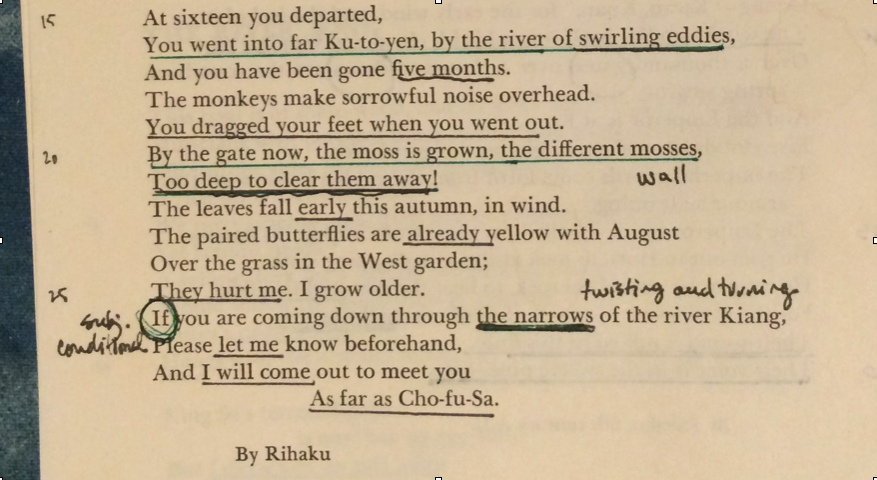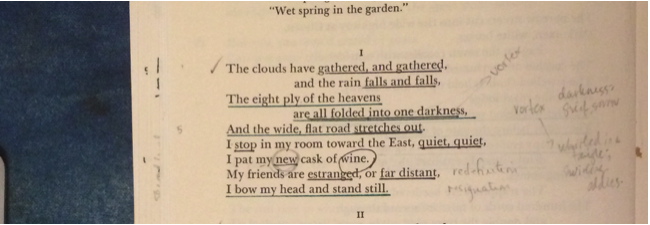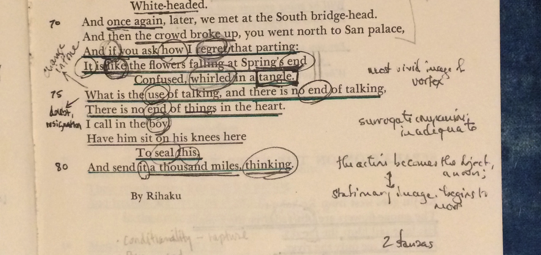4th Annual NAPOMO 30/30/30 :: Day 22 :: Lauren Neefe on Ezra Pound
[line]On or about August 1996, my character changed: I traded a literary dictator for a cultural pariah.
It was the summer before my last year of college, when I decided, god help me, to write an honor’s thesis in English. My plan was to write about T.S. Eliot and Wallace Stevens, god help me, and there might have been a third, probably white, probably male. But my adviser, god bless him, suggested a lateral, radical move: why not Pound? More precisely, Cathay, but only if I wanted to, have a look, see what I think.
It was, I think, two years earlier that I took the course that most profoundly shaped the way I move about in the world. Led by the chair of the philosophy department, we read Aristotle’s Nicomachean Ethics, a book called Innocence and Experience by the late philosopher Stuart Hampshire, Billy Budd, Walden—somewhere in there our progress was interrupted by the bombing of the Murrah Building in Oklahoma City, for which our TA’s dog was called to duty in search of bodies—and, for me the game changer, the Zhuangzi. The professor put it to us like this: “You cannot get to where you have to be by starting where you are.” You might or might not thank me for that later.
So I’d been primed for Cathay, the series of seventeen translations of mostly classical Chinese poems, diverted through Japanese on their way to Pound the traitor, who crafted little lyrics from the unfinished annotated transliterations of American Orientalist Ernest Fenollosa and published them in 1915. They are war poems. In the very way that, I would later learn, The Prelude and Austen’s novels are war literature. But back then, I just diligently underlined the verses with a dirty white six-inch ruler I still own. I read and marveled at Hugh Kenner’s The Pound Era and Stephen Owen’s Remembrances, the thick and the thin of one kind of literary critical virtuosity. And I wrote a tortured thesis about vorticism’s animation of the image-unit and the three epistolary poems in the series: “The River Merchant’s Wife: A Letter,” “Exile’s Letter,” and “To-Em-Mei’s Unmoving Cloud.”
The first is the best known, giving Donne’s twin compasses the high modernist treatment as “paired butterflies…already yellow with August.”

The third, it just now occurs to me, wouldn’t be half bad as a hip-hop lyric. Squinch your ears and you can almost hear Digable Planets or Guru or maybe LL Cool J easing through the stanzas:
[articlequote]
The clouds have gathered, and gathered,
and the rain falls and falls,
The eight ply of the heavens
are all folded into one darkness,
And the wide, flat road stretches out.
[/articlequote]

But the second, the second is one of my favorite poems of all time. I am rarely slain the way I am by the plaint and suspension of that letter’s final lines:
[articlequote]
And if you ask me how I regret that parting:
It is like the flowers falling at Spring’s end
Confused, whirled in a tangle.
What is the use of talking, and there is no end of talking,
There is no end of things in the heart.
I call in the boy
Have him sit on his knees here
To seal this,
And send it a thousand miles, thinking.
[/articlequote]

It’s the unscalable pun, end. Matched only by différance. My life would be complete if someone wrote me a letter like that.
In other words, it is hard to know what the first trauma was, but I am certain the Romanticism of my longing began here. As a doctoral student, I betrayed the modernists for the Romantics: let’s call it the second heave in the movement of my character. Their fragments and letters and fragments of letters make the perils of communication known. And my dissertation, equally tortured, became about letters and their parsing of other genres in the harrowing course of serial publication.
Now I know Coleridge would call that pun “measureless.” Shelley, “unbodied joy.” And now I read Keats’s urn and the Romantic georgic in one of the Tang Dynasty poems I learned from Owen, the Harvard comparatist, while researching my thesis on Pound:
“Song of an Arrowhead from the Battlefield of Chang-ping,” by Li He (a.d. 791–817), translated by Owen
[box]
Char of lacquer, powder of bone,
. .pebble of cinnabar:
in the chill gloom the ancient blood
. .blooms flowers in the bronze.
The white feathers and gilt shaft
. .have gone in the rains,
and all that remains is this
. .three-spined, broken wolf’s fang.
I went searching over that level plain,
. .driving my two-horse team,
through the stony fields east of the station
. .by the foot of a weed-grown slope;
Daylight shortened, the wind was steady,
. .stars hung in its moaning,
black banners of cloud were draped soaking
. .in empty night sky.
To my right and left their wraiths
. .cried out, starving, lean:
I poured a jug of cream in libation,
. .took a lamb to roast.
Insects settled, the geese flew sick,
. .the sprouts of reeds turned red,
and spiraling gusts sent the traveler on his way,
. .blowing their shadowy fires.
Seeker of the past, tears streaming,
. .I reaped this snapped barb,
whose broken point and red-brown cracks
. .once cut through flesh.
On a southern lane in the capital’s eastern ward
. .a boy on horseback
tried to get me to trade the metal
. .for an offering basket.
[/box]
Pound necessarily offends. His Cathay translations are naïve products of imperialism. They do not even know to take care with their Orientalism. One nevertheless spots the traces of Cathay in late-twentieth-century translations by the properly trained. For the broadcasting of his Fascist sympathies, he was necessarily cast out and indecently caged. We have this to thank for the Pisan cantos. Pound, I think, asks one to live a little with the unforgivable.
Between the honors thesis and the doctoral thesis, there was the Writing Seminars, where Mark Strand’s charismatic authority restored Wallace Stevens to my own naïve Orientalism and where I wrote the poem on which this reflection ends. Pound, you’ll see, is still the ground, turned over with the elongation and cadence of Elizabeth Bishop’s syntax. Maybe the three aren’t such strange verse mates, since Edmund White reports that he and Bishop fan David Kalstone bonded over an admiration for “Exile’s Letter.” But anyway, “Erasing de Kooning”:
[box]
When the last poem I write
In dark ink renders the crest of
The mountain that dominates an ancient
Sea-bound landscape, the thought will have disappeared
Inches above the barely weeping trees
Absolved of its ink, and there
Dissemble there not gleaning a poem
At all where all this plain ebbs
And flows, amounting to something and
To nothing, and, I hope, something else again
(a yellow stamen, a dust of pollen)
Which leaving there is
Prepared for what, in a different scroll,
In a similar room, becomes
A wide, flat black stem arching
To suppose a red lotus blossom
In air—but for you
Never there
[/box]
[line][line]
[textwrap_image align=”left”]http://www.theoperatingsystem.org/wp-content/uploads/2015/04/LAN_ProfilePic-e1429724630803.jpeg[/textwrap_image] LAUREN NEEFE lives in Atlanta. She teaches Romanticism, poetry, and now, apparently, sound-type stuff at Georgia Tech. She has written on Byron, Plath, Beck, McQueen, even a dotcom architecture firm, but she is most proud of the poems published in 1913 and Kenning Journal and performed by the NYC poetry/theater collective Emotive Fruition.
[line] [h5]Like what you see? Enter your email below to get updates on events, publications, and original content like this from The Operating System community in the field below.[/h5] [mailchimp_subscribe list=”list-id-here”] [line] [recent_post_thumbs border=”yes”]


![[Ezra Pound at William Carlos Williams' house in 1958 by Richard Avedon]](http://www.theoperatingsystem.org/wp-content/uploads/2015/04/avedons_pound_1958.png)
